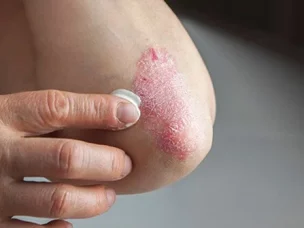Atopic dermatitis
Topical Niclosamide for Staphylococcus aureus Colonization in Atopic Dermatitis
For decolonizing atopic dermatitis lesions infected with Staphylococcus aureus, 2% ATx201 ointment is a safe and effective treatment. Staphylococcus aureus is frequently associated with the colonization of lesions in atopic dermatitis (AD) patients. This may contribute to the severity and progression of AD in these individuals. This highlights the need for treatments that reduce the...
Fig Leaf Tea in Mild Atopic Dermatitis
Fig leaf tea is safe and effective for reducing EASI values in patients with mild AD and can be taken continuously for the management of AD symptoms. Atopic dermatitis (AD) is a recurrent pruritic skin disease that does not have a definitive cure. Previous studies on animals and cultured cells have demonstrated the role of...
Efficacy and Safety of Abrocitinib in Phase 3 JADE EXTEND Trial
Abrocitinib is a JAK-1 selective inhibitor that is safe and effective for the treatment of moderate-to-severe atopic dermatitis in prior dupilumab responders as well as nonresponders in the current JADE EXTEND trial. There are limited treatment options for moderate-to-severe atopic dermatitis (AD) that is not responsive to topical formulations. Dupilumab, an anti-interleukin 4 receptor alpha...
Efficacy of Upadacitinib With Topical Corticosteroids in Atopic Dermatitis (AD)
This 52-week phase 3 atopic dermatitis (AD) study indicates that upadacitinib with topical corticosteroids has the potential to be a successful and well-tolerated long-term treatment option for people with moderate-to-severe atopic dermatitis. Atopic dermatitis (AD) causes skin-related disability and burden over the long run. Over the course of 20 to 30 years, most AD patients...
Dupilumab Reduces Hospitalizations for Moderate-to-Severe Atopic Dermatitis.
In patients with moderate-to-severe atopic dermatitis (AD), dupilumab significantly reduces hospitalization rates and hospitalization length related to AD. Atopic dermatitis (AD), a chronic inflammatory skin disease, may necessitate inpatient hospitalization for refractory cases, severe flares (exacerbations), and infections. A U.S. study also found that 18.9% of hospitalized individuals with a primary diagnosis of AD or...
Nemolizumab Plus Topical Agents in Patients With Atopic Dermatitis
Long-term nemolizumab therapy in patients with AD and moderate-to-severe pruritus significantly improves pruritus, AD, and quality of life. Pruritus is a distinguishing symptom of atopic dermatitis (AD), an inflammatory skin disorder that affects up to 25 percent of children and 5 percent of adults globally. The exact cause of pruritus in AD is unknown, but...
Difamilast Ointment for Atopic Dermatitis in Adults
Difamilast ointment is superior to vehicle in terms of severity index score and overall eczema area in patients with AD, according to a recent trial, which reported only mild to moderate adverse effects of difamilast. Atopic dermatitis (AD) is an inflammatory skin condition that frequently occurs in children. AD has a relapsing-remitting nature and is...
Prenatal Antibiotic Exposure and Infant Atopic Dermatitis
The administration of prenatal antibiotics in the 3rd trimester of pregnancy in women over 30 years of age is significantly associated with the onset of AD in the offspring. Initiating in utero, the human microbiome is integral to the normal metabolic and immune function later in life. Microbial exposure is influenced by antibiotic use, breastfeeding,...
Dupilumab Treatment in Children with Atopic Dermatitis
Dupilumab is effective for improving quality of life, sleep, and signs and symptoms of AD in children aged 6-11 years. Atopic dermatitis (AD) is the most prevalent inflammatory skin condition in infants and children. AD appears within six months of age in 45% of cases, less than one year of age in 60% of cases,...
More Medical News














